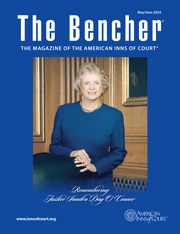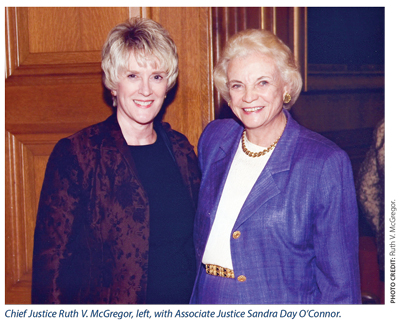Sandra Day O’Connor Lived the Values of the American Inns of Court
The Bencher—May/June 2024
By Chief Justice Ruth V. McGregor (Ret.)
 Any attempt to encompass the life and impact of Justice Sandra Day O’Connor in a few paragraphs will be incomplete. Her fingerprints—left during a public service career and retirement that spanned more than 50 years—are everywhere. She forged a path that countless women were able to follow, often with her guidance and always with her encouragement.
Any attempt to encompass the life and impact of Justice Sandra Day O’Connor in a few paragraphs will be incomplete. Her fingerprints—left during a public service career and retirement that spanned more than 50 years—are everywhere. She forged a path that countless women were able to follow, often with her guidance and always with her encouragement.
O’Connor changed the Supreme Court of the United States, not only through her participation in formal decisions but also through her willingness to speak with countless groups as she explained the work of the court and its importance to our system of government. She made the court a more open institution, both for those with whom she worked, as she encouraged greater personal interaction among members of the court, and for those members of the public with whom she met and spoke.
She worked tirelessly to advance the rule of law and improve justice systems, both domestically and in other countries. She encouraged law students to understand the role of the legal profession in larger society. And she remained true to her belief that family and friends must remain central to our lives.
Interwoven through Justice O’Connor’s life are threads of the principles on which the American Inns of Court is based. Her active and enthusiastic support of the Inns is not surprising; the organization fosters principles that were of central importance to Justice O’Connor. Indeed, the Inns Professional Creed summarizes many of Justice O’Connor’s beliefs about our justice system and legal profession.
The Professional Creed begins by admonishing that the “Rule of Law is essential to preserving and protecting the rights and liberties of a free people.” Justice O’Connor clearly agreed: She traveled throughout this country and to more than 100 other nations, working and speaking with lawyers, judges, and government officials about the central place of the rule of law to democratic governments. She cautioned that the rule of law and a system of justice, difficult to attain, are even more difficult to reestablish if lost.
Justice O’Connor, always practical in her approach, understood that vague principles garner little support from many members of the public. So she explained to her audiences, as only she could, all the ways a fair, functioning system of laws affects our everyday lives and how much we all depend on having a fair and impartial judicial system available when we need it. Most of us don’t hold a position that allows us to speak with equal authority about the importance and impact of rule of law, but I am certain that she would expect each of us to speak about and conduct our activities in a manner that celebrates and extends the rule of law.
Justice O’Connor also strongly encouraged lawyers to comply with the direction in the Professional Creed to uphold “the standards of the profession with dignity, civility, and courage” and to “contribute time and resources to public service, charitable activities, and pro bono work.”

Early in her years on the Supreme Court, the justice became increasingly concerned with the lack of civility and “win at any cost” mentality among some members of the bar. Throughout her career, as a lawyer, politician, and judge, she practiced the art of agreeing when possible and disagreeing agreeably when necessary. She demonstrated through her actions that much can be accomplished when people of goodwill come together in a spirit of compromise.
On one occasion, I was with her as we read an article that described common practices of lawyers who regarded professionalism as a detriment to success. To say that she was appalled is an understatement. She accepted the challenge to do all she could to encourage lawyers to uphold the tenets of our profession. She spoke to law students, professional organizations, and individuals about what they could do to reinvigorate the best and most professional approach to the practice of law. She emphasized the rewards that come from volunteer and public service. She reminded us that civil discussion begins with a willingness to listen to the views of others. And she somehow did it all without sounding accusatory. Her message was effective because it so obviously reflected her commitment to and love of the profession. She called for the best from us all, and many responded.
 Justice O’Connor’s statements reveal her commitment to another Inns value: the goals of diversity and inclusivity. Her opinions reflect her understanding that our laws and Constitution do not permit discrimination based on class membership and a further understanding that diversity enriches and strengthens our institutions. Every aspect of her own life reflected her ability to accept persons for who they were and to value all for their lives, not their identities.
Justice O’Connor’s statements reveal her commitment to another Inns value: the goals of diversity and inclusivity. Her opinions reflect her understanding that our laws and Constitution do not permit discrimination based on class membership and a further understanding that diversity enriches and strengthens our institutions. Every aspect of her own life reflected her ability to accept persons for who they were and to value all for their lives, not their identities.
We will miss Justice O’Connor’s clear voice as we consider and confront issues central to our profession. We can best honor her memory by accepting responsibility for making our profession one known for its professionalism. We can each demonstrate the value of civility in daily interactions and refrain from attacks that do not advance understanding. We can play our part in ensuring that our profession values diversity and inclusiveness. If we follow Justice O’Connor’s lead, we can rightly claim that we listened to her admonitions, we heard her, and we took action to make her goals for the profession she loved become a reality.
Chief Justice Ruth V. McGregor (Ret.) served on the Arizona Supreme Court from February 1998 until June 30, 2009, and as chief justice from 2005 until her retirement in 2009. She was a judge on the Arizona Court of Appeals from 1989 to 1998 and was chief judge of the court from 1995 to 1997. Prior to her judicial appointment, she was in private practice with the Fennemore Craig law firm in Phoenix, Arizona. McGregor served as law clerk to Justice Sandra Day O’Connor during O’Connor’s first term on the Supreme Court of the United States. She is an Emeritus member of the Sandra Day O’Connor American Inn of Court in Phoenix. She was also a member of the American Inns of Court Board of Trustees from 1998 to 2006, serving as secretary from 2000 to 2004.